Rhodesian Ridgeback mixes are loyal, intelligent, high energy breeds. Most will be medium to large dogs that share the guarding instincts of their Ridgeback parent and reserve towards strangers. We’ll be looking at the health and personality traits of some of most popular Rhodesian Ridgeback cross breeds. We’ll talk about their exercise and training needs, and likely size and life expectancy. And we’ll help you to decide whether a Rhodesian Ridgeback mix puppy is the right companion for your family!
Contents
- The Rhodesian Ridgeback
- What is a Rhodesian Ridgeback mix?
- Rhodesian Ridgeback mix breeds
- Are they good pets?
Rhodesian Ridgeback Mix Origins
The Rhodesian Ridgeback originally comes from Rhodesia, the African country now known as Zimbabwe. So it is probably no surprise to learn this dog’s nickname is “African Lion Dog!” The Rhodesian Ridgeback is a truly ancient purebred dog with origins still partially shrouded in mystery. The breed name comes from a distinctive feature – the appearance of a “ridge” that follows the length of the dog’s spine.
Modern genetic science has begun to unravel the mysteries behind the Rhodesian Ridgeback breed’s origins. A 2015 journal article has linked the Ridgeback to the Great Dane and a number of other sizeable working K9s along with a handful of companion breeds.
Size, Height and Weight
The Rhodesian Ridgeback stands 24 to 27 inches tall and weighs 70 to 85 pounds. Males are slightly taller and larger than females. The height and weight of a Rhodesian Ridgeback cross breed, will depend partly on the size of the other parent. But these are unlikely to be small dogs!
Personality and Temperament
These dogs are brave and confident! In addition they are loving and affectionate with “their” people but reserved around strangers. They also have an exceptionally strong prey drive, likely born out of their history chasing (but not killing) lions. For this reason, you’ll need to practice a really strong recall with them, so you know they’ll come back when you let them off leash.
The Rhodesian Ridgeback bays like a hound and tracks like one too. In addition, many breeders and canine experts feel these dogs, with their unique background and history, may be more suitable for an experienced owner and trainer.
Coat Care and Shedding
The Rhodesian Ridgeback’s ridged coat comes in only one color – “wheaten”. The ridge itself is formed by a thin strip of backwards-growing hair that follows the curve of the spine. A trait common in African dog breeds. This dog will shed. However, the short, flat, smooth coat is easy to maintain with basic brushing and the occasional bath.
Health and Longevity
This dog’s typical lifespan is 10 to 12 years. Health issues Rhodesian Ridgeback owners need to be aware of are:
- hip and elbow dysplasia
- eye issues
- heart disorders
- congenital deafness
- autoimmune thyroiditis.
What is a Rhodesian Ridgeback Mix?
A Rhodesian Rhidgeback mix is any dog that has one Rhodesian Ridgeback parent and another parent from a different breed. They might inherit a lot of the characteristics of the Ridgeback, but they might be a lot more like their other parent. You won’t know until your puppy is born and grows up!
It’s really important that when choosing a Rhodesian Ridgeback mix, you pick one where you like the looks and temperament of both parent breeds. That way however your puppy turns out, you’ll be happy!
Rhodesian Ridgeback Mixes
Have you arrived here in search of information about a specific hybrid Rhodesian Ridgeback dog? This clickable list can get you there fast!
- American Pit Bull Terrier Rhodesian Ridgeback Mix (Pitbull Ridgeback)
- American Staffordshire Terrier Rhodesian Ridgeback Mix
- Basenji Rhodesian Ridgeback Mix (Rhodesian Basenji)
- Boerboel Rhodesian Ridgeback Mix (Rhodesian Boerboel)
- Border Collie Rhodesian Ridgeback Mix
- Boxer Rhodesian Ridgeback Mix (Rhodesian Boxer)
- Doberman Pinscher Rhodesian Ridgeback Mix (Doberman Ridgeback)
- German Shepherd Rhodesian Ridgeback Mix (German Ridgeback)
- Golden Retriever Rhodesian Ridgeback Mix (Golden Ridgeback)
- Great Dane Rhodesian Ridgeback Mix
- Greyhound Rhodesian Ridgeback Mix
- Irish Terrier Rhodesian Ridgeback Mix
- Irish Wolfhound Rhodesian Ridgeback Mix
- Labrador Retriever Rhodesian Ridgeback Mix (Rhodesian Labrador)
- Mastiff Rhodesian Ridgeback Mix
- Pharaoh Hound Rhodesian Ridgeback Mix (Pharaoh Ridgeback)
- Redbone Coonhound Rhodesian Ridgeback Mix
- Rottweiler Rhodesian Ridgeback Mix
- Saint Bernard Rhodesian Ridgeback Mix (Saint Ridgeback)
- Scottish Deerhound Rhodesian Ridgeback Mix
American Pitbull Terrier Rhodesian Ridgeback Mix
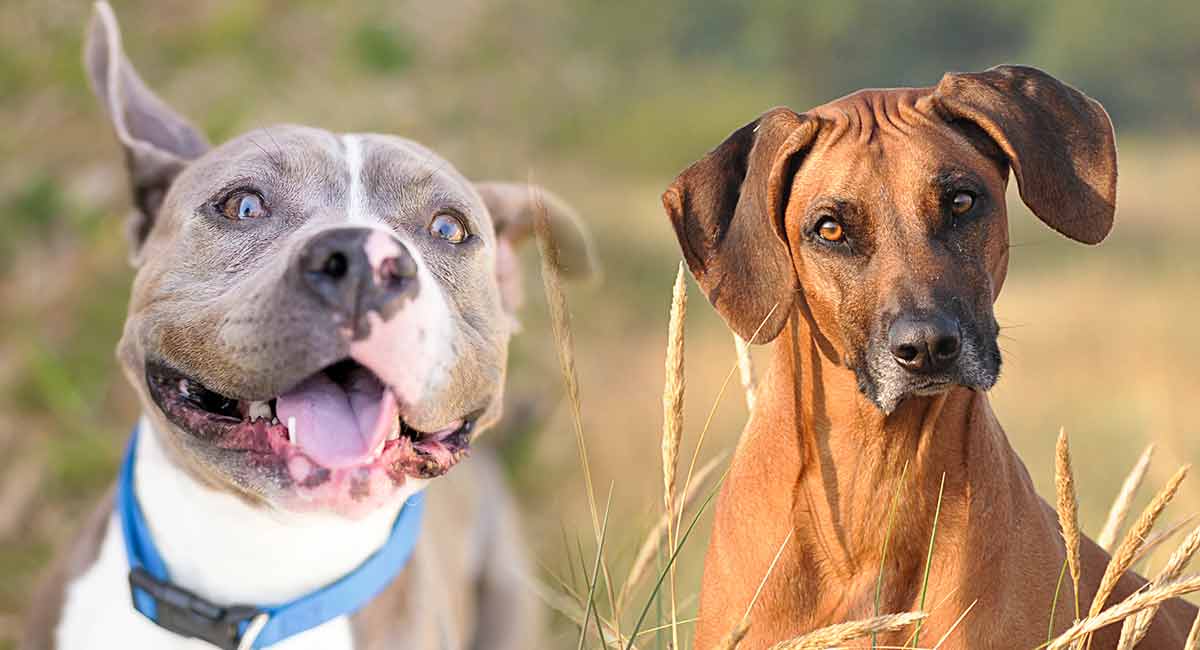
The Pitbull Ridgeback can weigh 30 to 85 pounds with a life expectancy of 8 to 15 years. This dog will have strong protective and guarding instincts tempered by an equally strong bond with “their” people. This mix dog will shed year-round but is not time-intensive to maintain.
American Staffordshire Terrier Rhodesian Ridgeback Mix
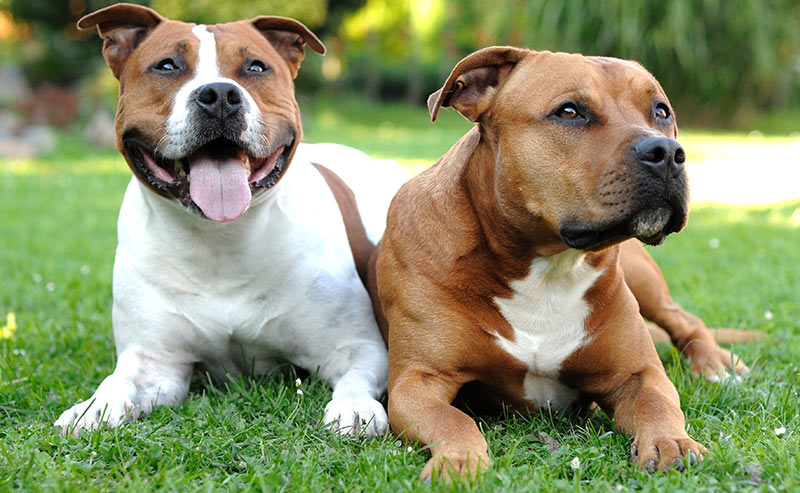
This mix dog will weigh 40 to 85 pounds and can live 10 to 16 years. The AmStaff terrier influence can give this hybrid a personality more suited for family and community life. This dog will be a natural athlete and can really benefit from participation in K9 work or athletics.
Basenji Rhodesian Ridgeback Mix
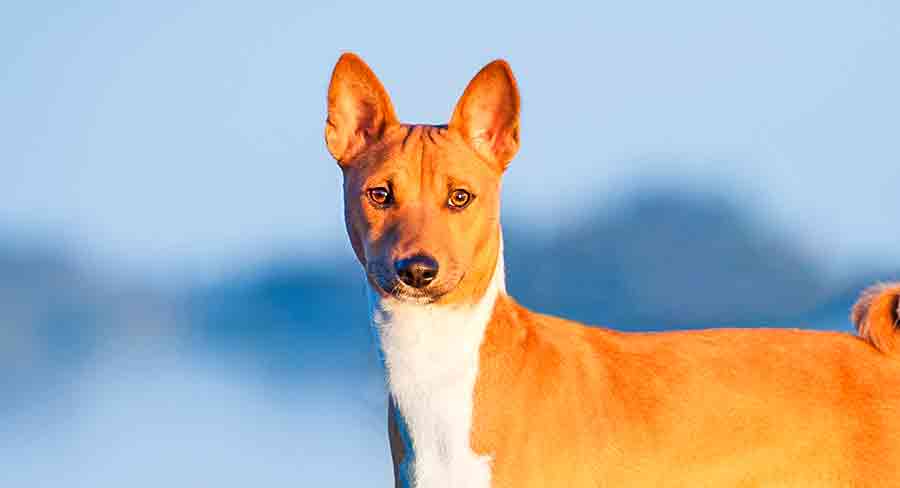
The Basenji Ridgeback will weigh 22 to 85 pounds with an average lifespan of 10 to 14 years. This dog brings together the ancient primitive Basenji,the barkless dog, with the Rhodesian Ridgeback’s hound-like baying. As a result your dog may or may not vocalize. This dog will be fastidious and largely self-maintaining.
Boerboel Rhodesian Ridgeback Mix (Rhodesian Boerboel)
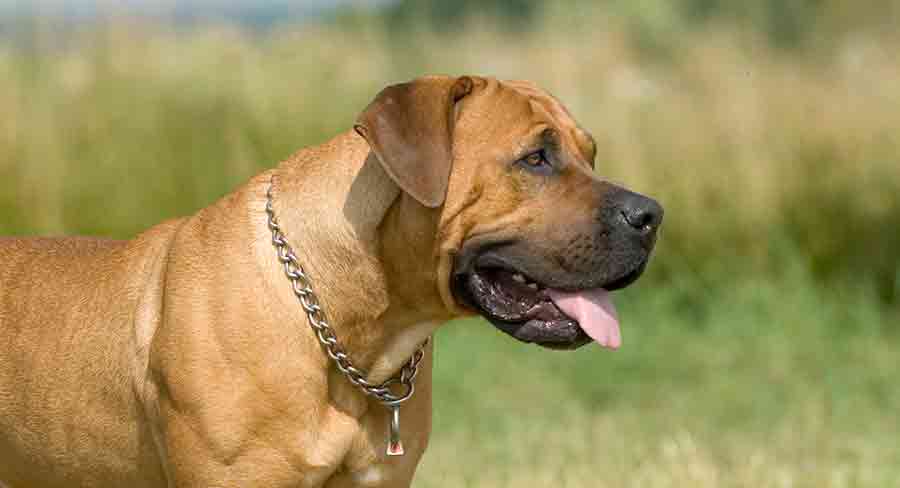
The Rhodesian Boerboel combines a South African mastiff with a South African hound, giving you a dog that can weigh anywhere from 70 to 200+ pounds and live 9 to 12 years.
Both parent dogs will contribute strong protective and guarding instincts and a confident, independent and dominant personality. You can expect moderate shedding with light brushing and grooming duties.
Border Collie Rhodesian Ridgeback Mix
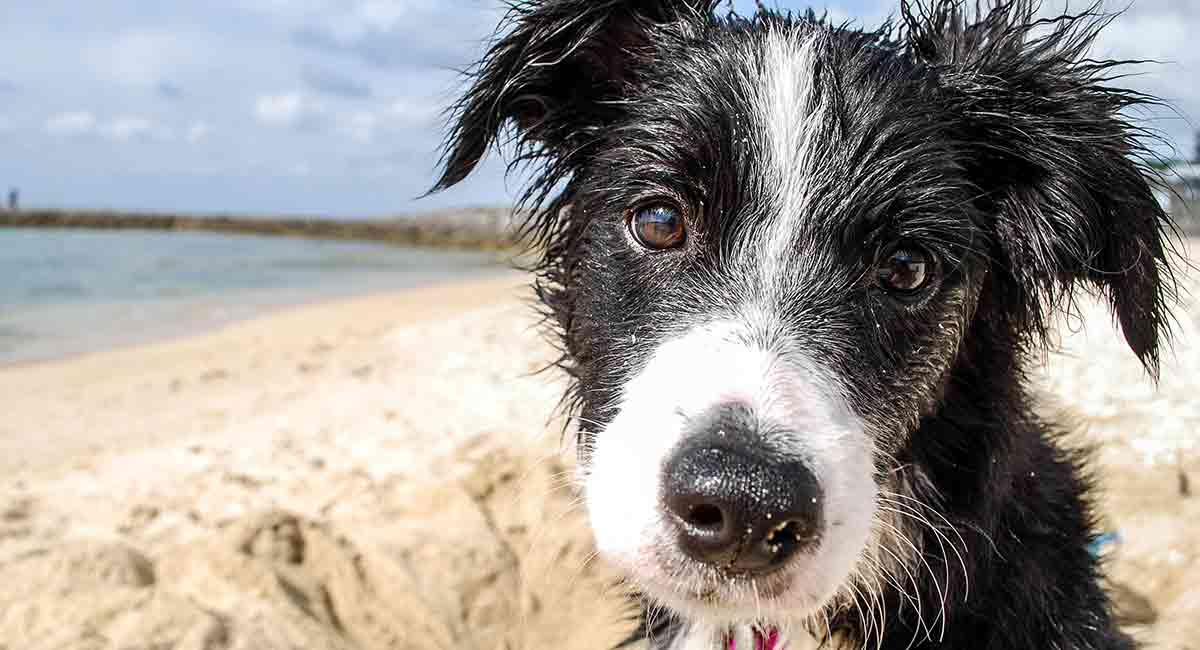
The Border Collie Rhodesian Ridgeback will weigh 30 to 85 pounds and live 10 to 15 years. This dog will have a naturally high energy level and a strong desire to chase, herd, guard and hunt as a result. This dog will definitely shed year-round and seasonally.
Boxer Rhodesian Ridgeback Mix (Rhodesian Boxer)
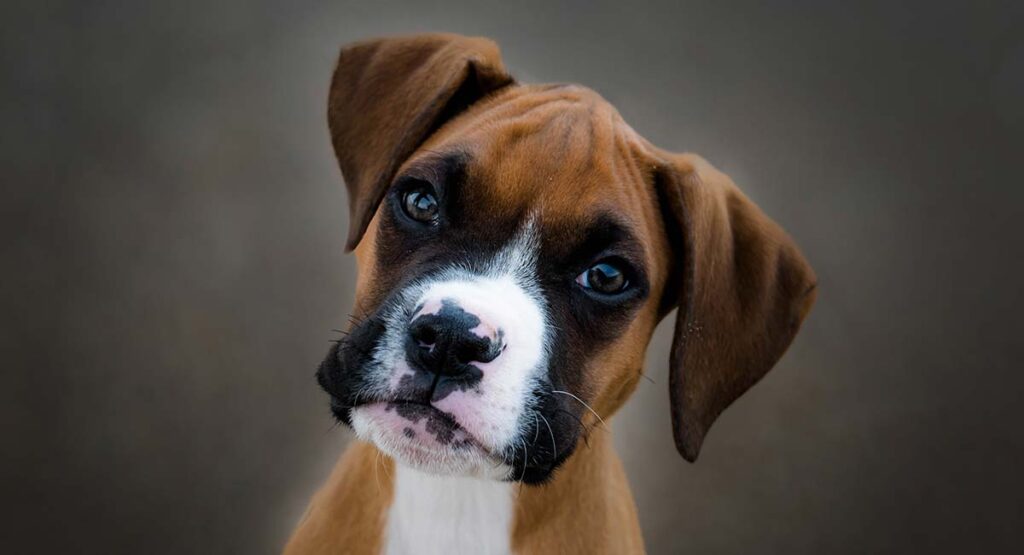
The Rhodesian Boxer will weigh 50 to 85 pounds and live 10 to 12 years. This dog inherits more of the true pet dog temperament from the Boxer side, in contrast to the ancient, independent-minded nature that comes from the Ridgeback side. The Rhodesian Boxer will shed year-round, but not profusely.
Doberman Pinscher Rhodesian Ridgeback Mix
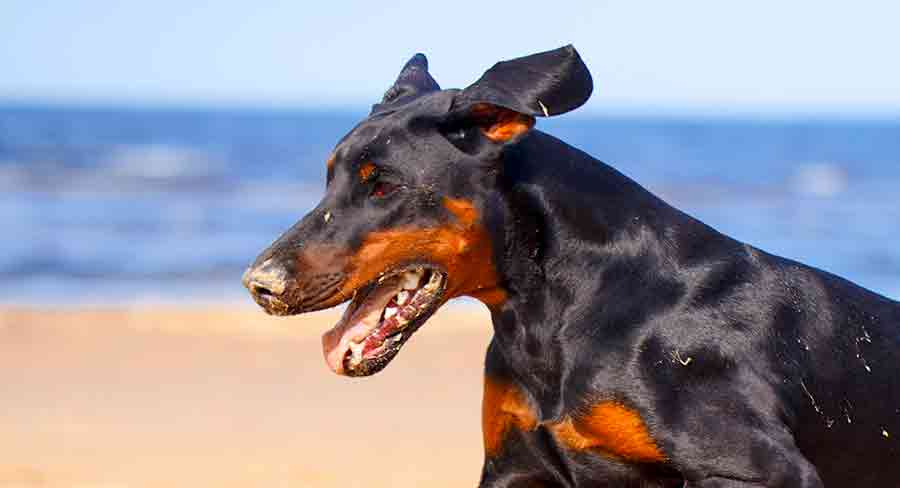
A Doberman Ridgeback is definitely a sight to behold! This dog can weigh 60 to 100 pounds of pure, sleek muscle. The life expectancy is 10 to 12 years. This hybrid dog can make an impressive watchdog and a loyal family guardian, certainly with the right early and ongoing training and socialization. The Doberman Ridgeback will shed year-round.
German Shepherd Rhodesian Ridgeback Mix (German Ridgeback)
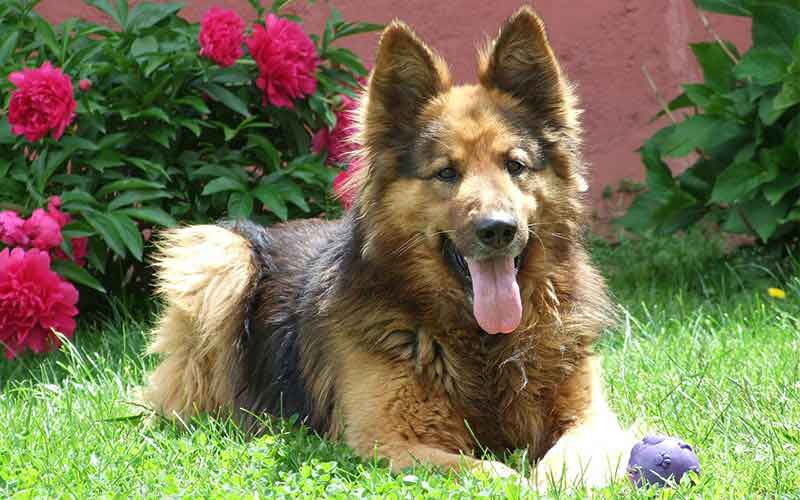
The German Shepherd Rhodesian Ridgeback mix can weigh anywhere from 50 to 90 pounds with a life expectancy of 7 to 12 years. This dog will have innate protective and guarding instincts and unstoppable courage. Consequently, with the right training and socialization, this dog can become a great hunting companion or working K9. Expect both year-round and seasonal shedding with light ongoing brushing and bathing duties.
Golden Retriever Rhodesian Ridgeback Mix
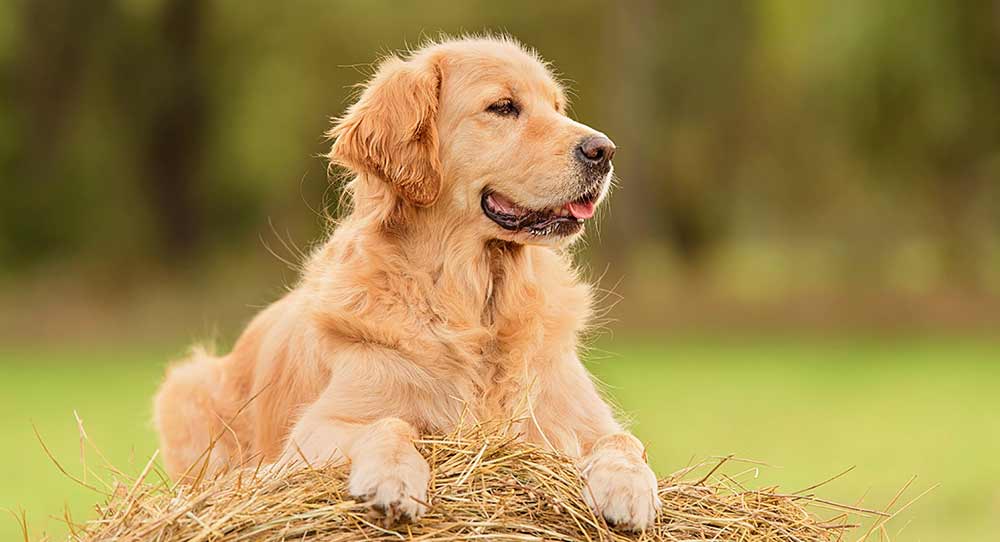
A Golden Ridgeback will weigh 55 to 85 pounds and live 10 to 12 years. This dog’s temperament will be an intriguing mix of the Golden Retriever’s notable friendliness with the Ridgeback’s natural reserve. One thing you can count on is year-round and seasonal shedding with this pup!
Great Dane Rhodesian Ridgeback Mix
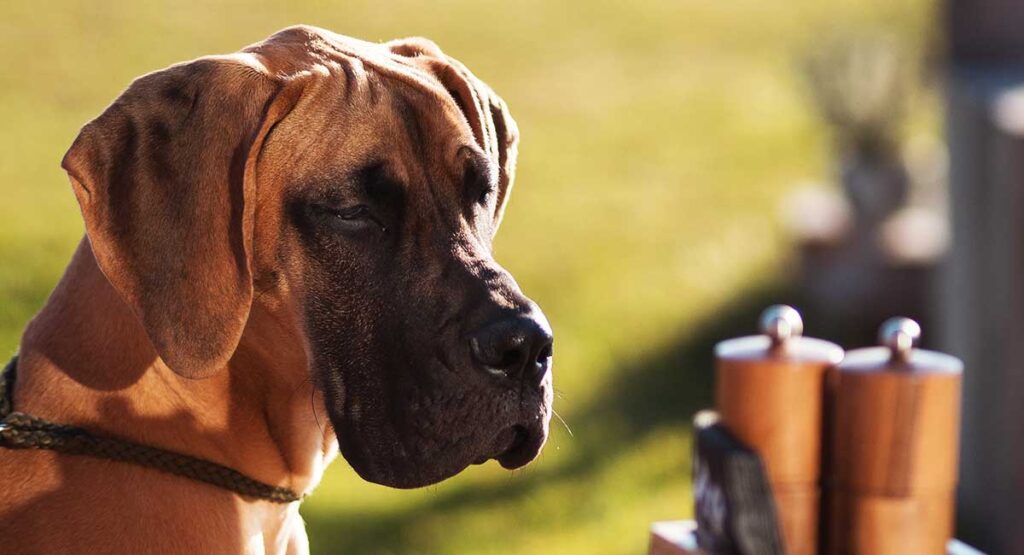
This imposing dog can weigh anywhere from 70 to 175 pounds. The average life span is 7 to 12 years. The Great Dane contributes a patient, friendly demeanour that can certainly mix well with the Rhodesian Ridgeback’s even temperament.
This dog’s sizewill make early training and socialization imperative in a pet setting. Both parent dogs will shed somewhat year-round and seasonally.
Greyhound Rhodesian Ridgeback Mix
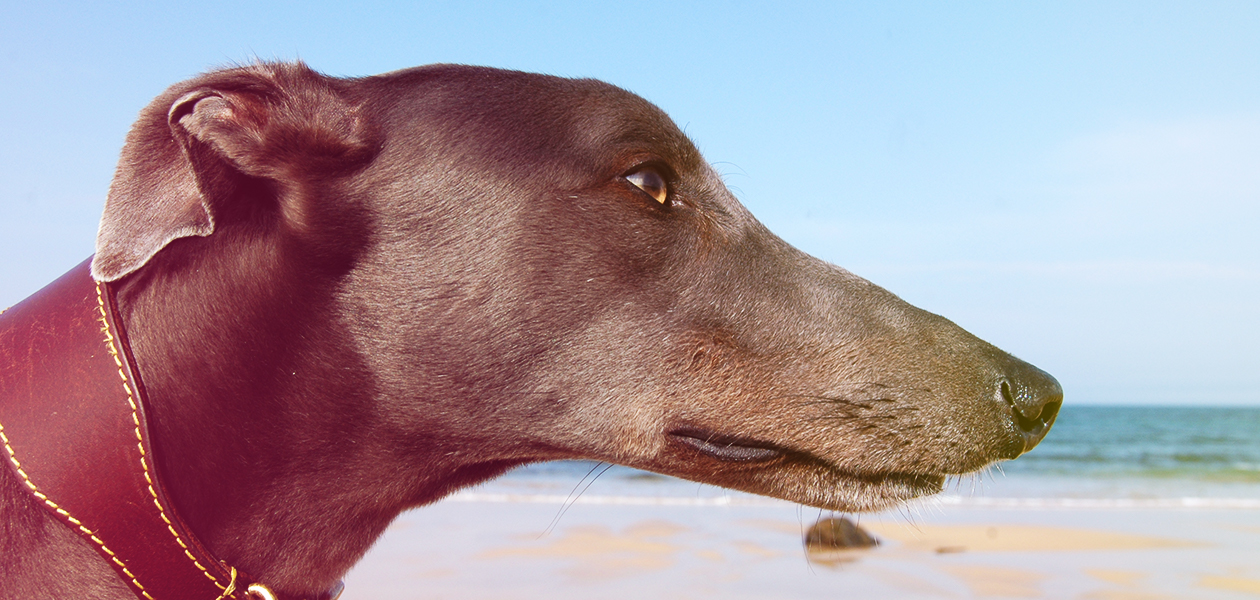
A Greyhound Rhodesian Ridgeback can weigh anywhere from 60 to 85 pounds. This will be a sleek and slim dog with an unstoppable drive to run.
This dog can be challenging to train on a number of levels and as a result may be best for a more experienced dog owner. This hybrid dog will shed somewhat year-round.
Irish Terrier Rhodesian Ridgeback Mix
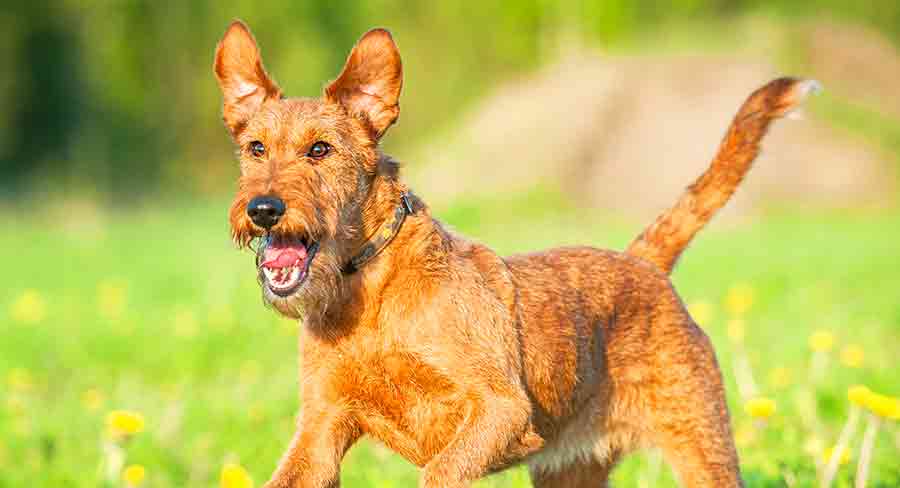
The Irish Terrier Rhodesian Ridgeback dog can weigh 25 pounds to 180 pounds. This hybrid dog has a life expectancy of 10 to 15 years.
This hybrid pup’s disposition can range from fiery terrier to independent hound. They tend to be loyal and protective of “their” people and property and can therefore be wary of strangers. If your dog inherits more of the terrier coat type, you may need to hand-strip and trim the coat to keep coat and skin in good health.
Irish Wolfhound Rhodesian Ridgeback Mix
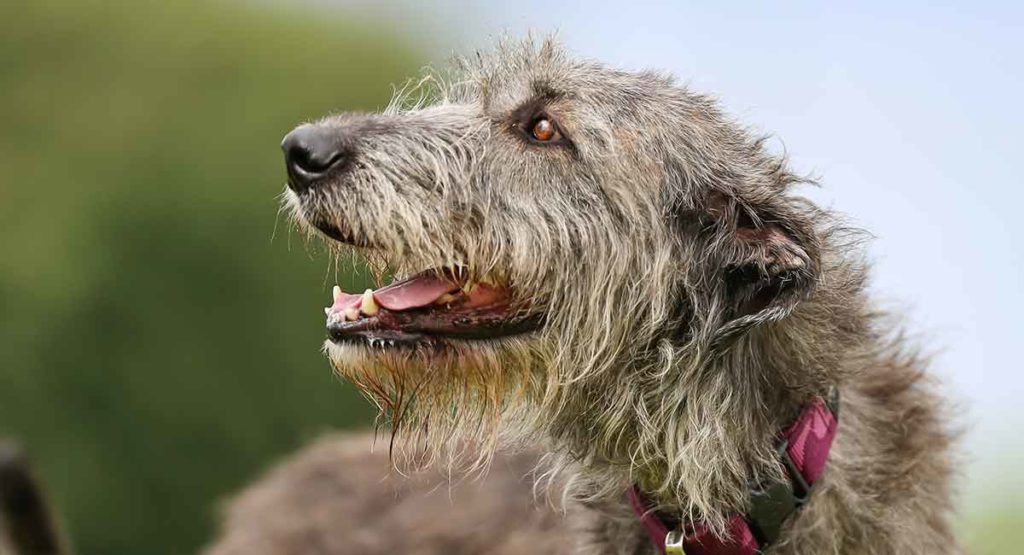
The Irish Wolfhound Rhodesian Ridgeback is going to be a big dog with a weight range from 70 to 120 pounds. This dog’s general lifespan ranges from 6 to 12 years.
An affectionate companion canine when well-socialized and trained, this dog’s independent streak can make them a handful in puppyhood. You will have shedding year-round and seasonally with this dog.
Labrador Retriever Rhodesian Ridgeback Mix
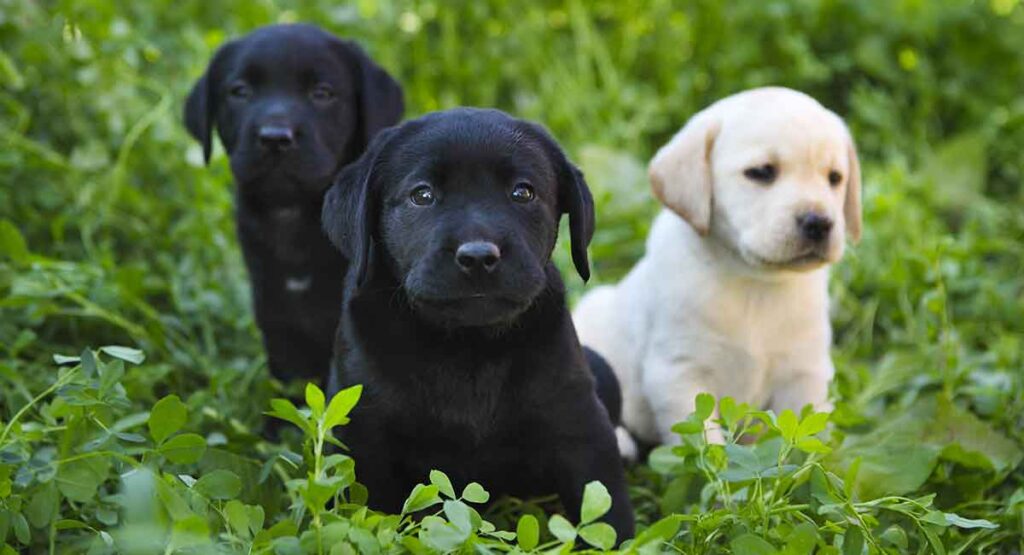
The Rhodesian Labrador will weigh 55 to 85 pounds and live 10 to 12 years. This dog receives an interesting mix of personality traits from each parent dog. The Labrador is famously friendly and as a result has been the number one companion canine in America for 26 years straight!
The Ridgeback on the other hand, is a dignified and independent ancient dog breed not recommended for first-time pet dog owners. Expect year-round as well as some seasonal shedding with this hybrid.
Mastiff Rhodesian Ridgeback Mix
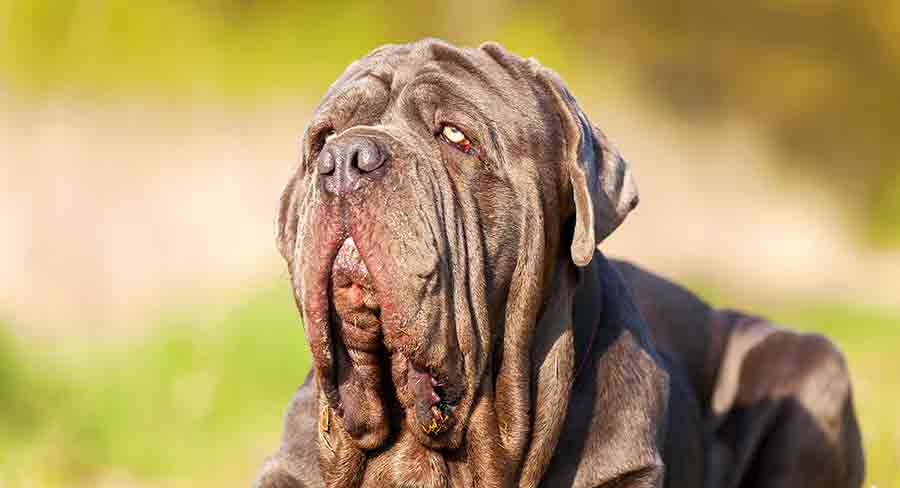
This dog will by far be the weightiest pup on this list! Expect an adult weight range of anywhere from 70 to 230 pounds. The life expectancy ranges from 6 to 12 years.
A Mastiff Rhodesian Ridgeback will inherit courage in spades from both parent dogs as well as strong guarding and protective instincts. That is to say this is definitely a dog that will benefit from early and consistent training and socialization. Your dog will shed year-round and seasonally and there may also be some (or a lot of) drool from the Mastiff side!
Pharaoh Hound Rhodesian Ridgeback Mix
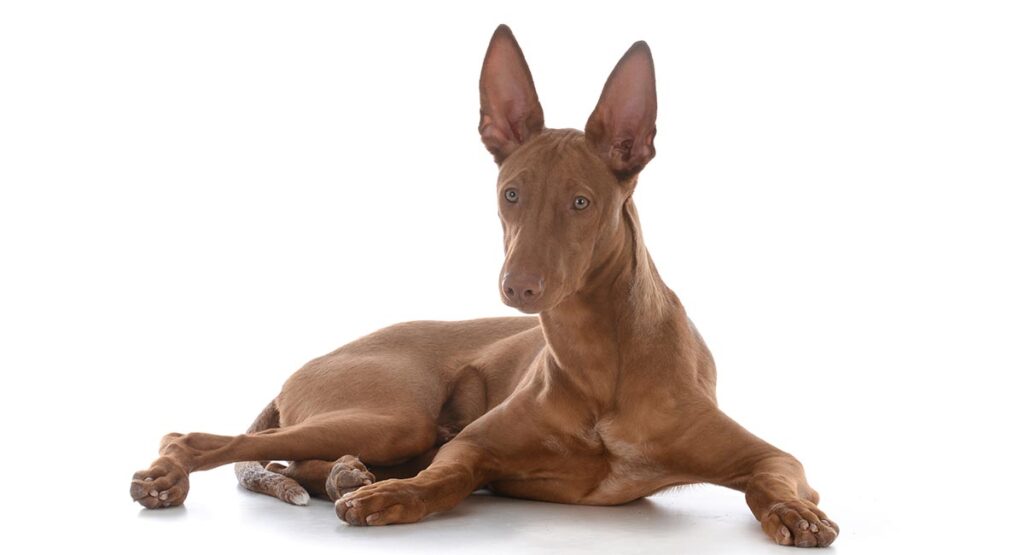
The Pharaoh Ridgeback combines two ancient dog breeds with hound backgrounds and strong prey drives. This dog will weigh 45 to 85 pounds with a lifespan of 10 to 14 years.
This dog may or may not inherit more of a gentle “pet type” temperament depending on which parent dog dominates. Either way, because of this pup’s high sprinting drive you’ll need to practice recall training with them so that they’ll come back when you let them off leash! This dog’s short, smooth coat won’t shed much and therefore will be largely self-maintaining.
Redbone Coonhound Rhodesian Ridgeback Mix
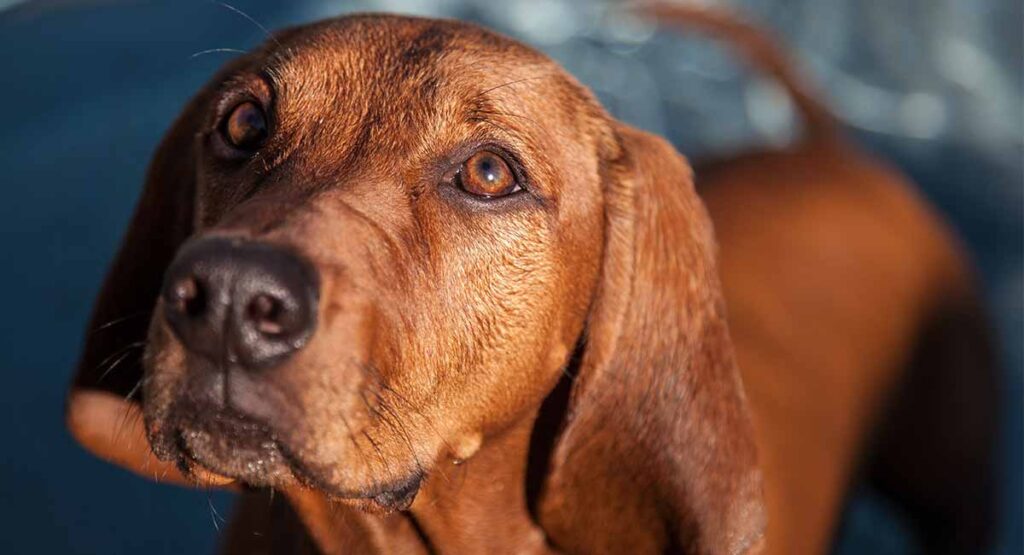
This hybrid pup can weigh anywhere from 45 to 85 pounds and can live anywhere from 10 to 15 years.
The Redbone Coonhound parent contributes thedistinctive and vibrant fire-red coat along with a calm temperament (when not on the hunt). This personality can combine well with the Ridgeback’s more stubborn and independent nature. This dog will shed moderately but coat care is mostly limited to brushing and occasional baths.
Rottweiler Rhodesian Ridgeback Mix
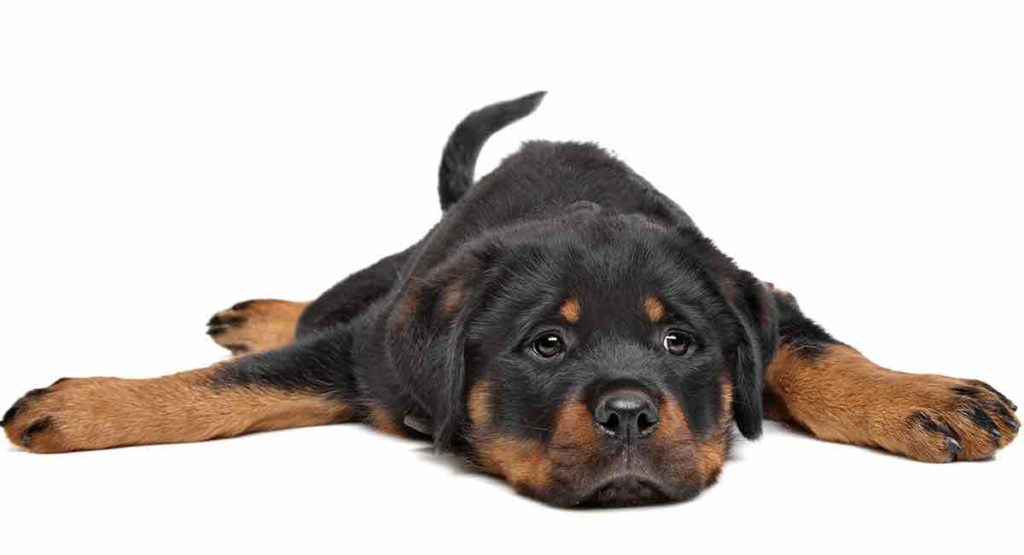
The Rottweiler Rhodesian Ridgeback dog can weigh anywhere from 70 to 135 pounds and has a lifespan of 7 to 12 years. From the Rottweiler side comes a guardian Mastiff and working K9. From the Ridgeback side comes a hunting hound.
Consequently this dog will have a strong protective and guarding instinctcoming from both parents, which means early socialization and training will be key to success in a companion canine setting. This dog will shed seasonally as well as year-round.
Saint Bernard Rhodesian Ridgeback Mix (Saint Ridgeback)
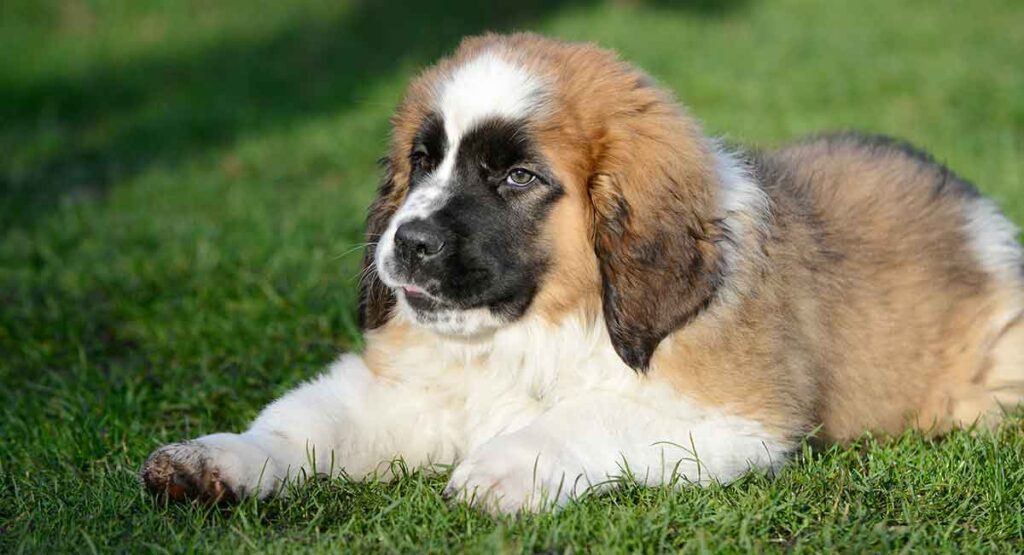
The Saint Ridgeback may grow up to weigh 70 to 180 pounds. The general life expectancy for this dog is 8 to 12 years. This dog receives different temperament influences from each parent dog.
For instance, from the Saint Bernard comes a loving, loyal and gentle nature. The Ridgeback side on the other hand, contributes a dedicated, independent and protective personality. You will see more shedding from this hybrid dog than many of the others you meet here due to the Saint Bernard influence.
Scottish Deerhound Rhodesian Ridgeback Mix
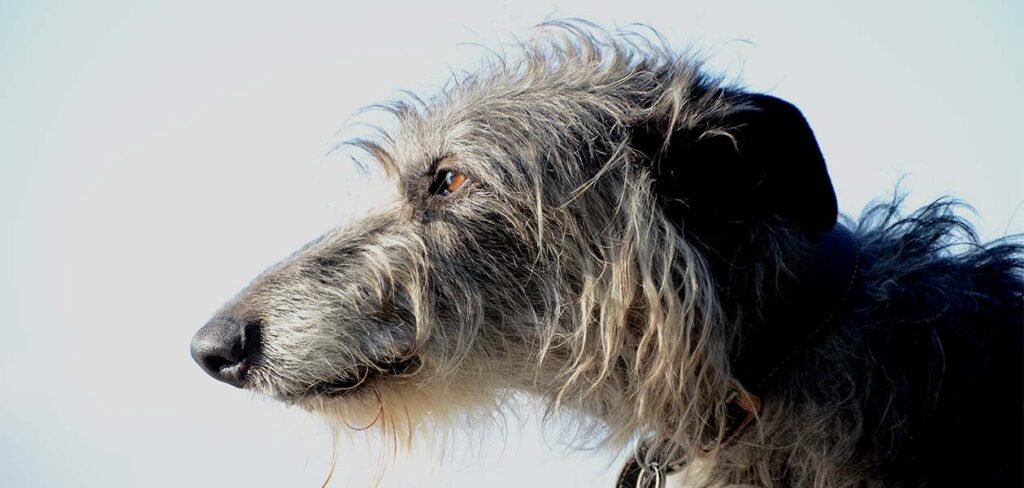
This dog can weigh anywhere from 70 to 110 pounds with a life expectancy of 8 to 12 years. This hybrid dog brings together the racing instincts of the Deerhound, a greyhound-type of incredible size, with the incredibly strong prey drive of the Ridgeback.
Because of this dog’s prey drive, it’s important to practice recall with them before you let them off leash. This dog will shed somewhat year-round and seasonally.
Is A Rhodesian Ridgeback Mix Right For Me?
When choosing a hybrid puppy it’s really important to be confident that you would like to live with either of the parent breeds. Or a combination of the two. Take particular care to look into their size, health and temperament.
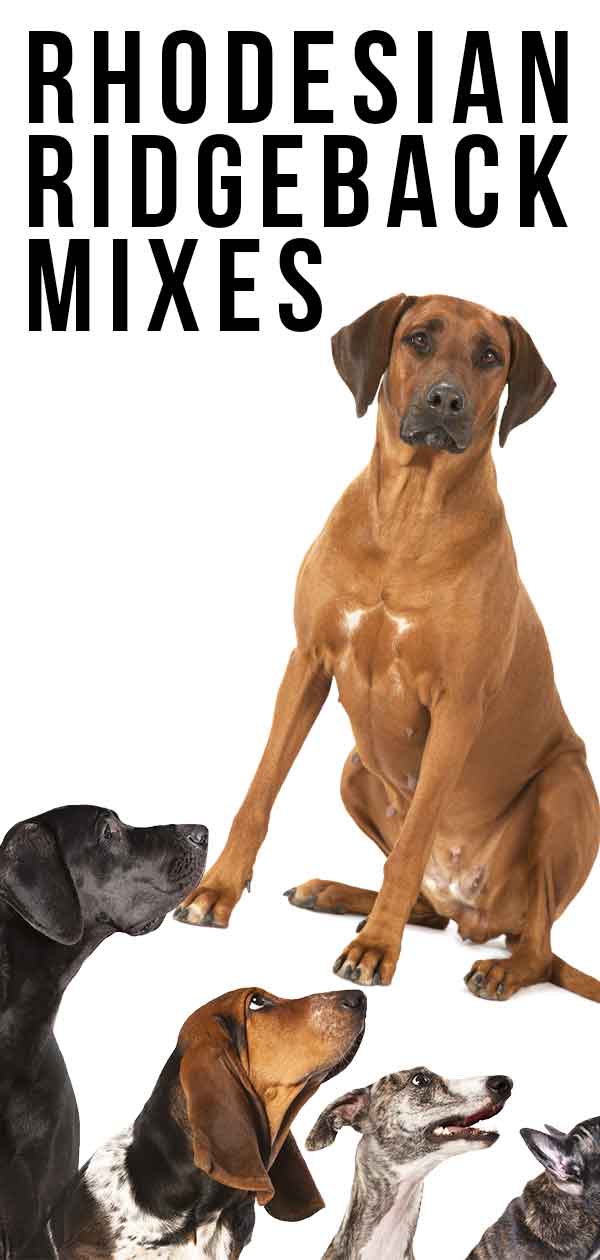
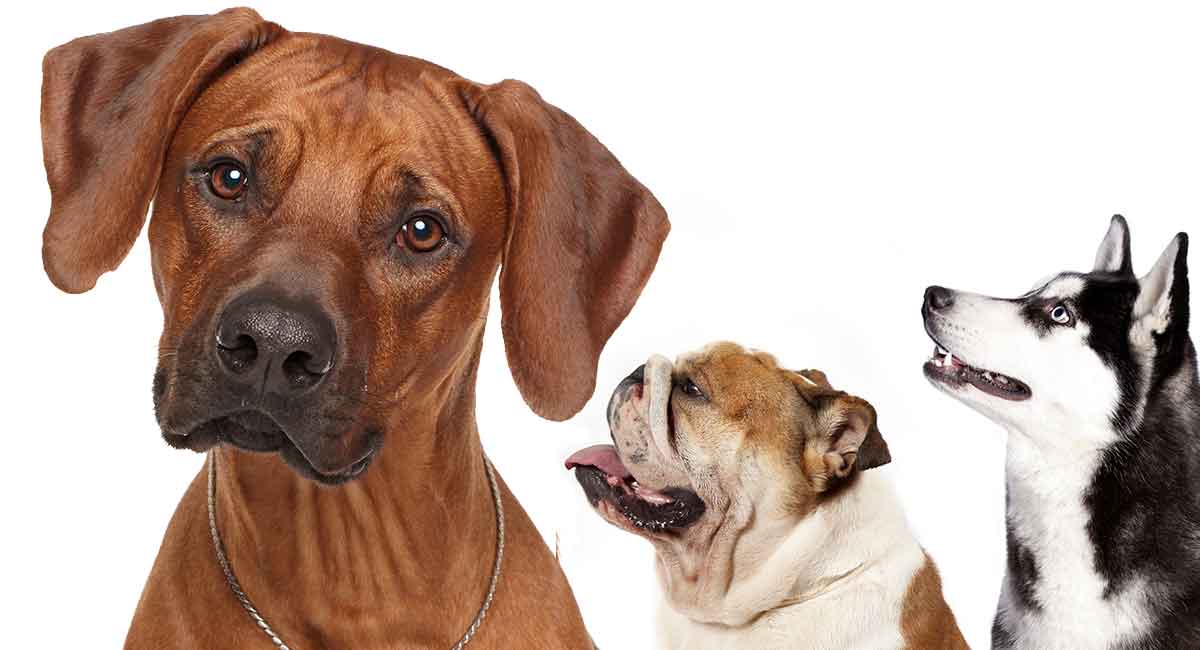

Monica says
My Rhodesian/Basenji male dog, called “Macho” died 4 years ago. He was 20 years old. The best dog I ever had. I want to get another Rhodesian/Basenji puppy. Does anyone know where could I look for one?
katie says
i have a male ridgeback X Great Dane he is the most loving majestic creature i have ever met he prances around like he is tough but really all he wants to do is make friends and he is super intelligent opens doors and rounds up our huntaway fox terrior cross when he decides to chase motorbikes i am so blessed
Derick says
My first dog as a 10 year old was a Black Rhodesian Labrador. He use to every month some times weekly. Go to the higher dog training class. I had him from age 2 we both fell in love from day one.
Jason was very intelligent once I was tired of my late older sister not closing my door so I spoke to him and said Jason don’t let Fran into my room. She woke me up Derick Jason won’t let go to my room as the room she was sleeping in was my old room and was a enclose balcony. He also after we sold our house and had to rehome found is
Way back to the house after running away from his new owners saw 2 GSD had a complete nervous breakdown they called my brother and lived with my older brother but never forgave me for giving him away.. Best dog.
Karie says
We lost our beautiful ridgeback girl last year, she was the best and we miss her so much. We don’t want to replace her, but we love the ridgeback breed. We are looking to take home a puppy towards the beginning of this coming summer 2022. Does anyone have any ideas or advice as to where we can find a ridgeback/Great Dane, ridgeback/lab, ridgeback/Weimaraner, ridgeback/golden retriever or a rare color ridgeback litter? I have no idea where to even start. I’ve been hitting a wall with google. We’d love to have a pup for our boys to grow up with that will be big enough to rough house and playful/friendly enough to trust with neighbors. Thank you so much for your help.
ian mcmanus says
I have recently lost my KC ridgeback and looking to aquire a scottish deerhound ridgeback x.
any help would be appreciated
Helena Macauley says
My female Ridgeback had 2 litters of Rhodesian Ridgeback x Boerboel pups.
All 25 pups had perfect ridges except 1 female , who had a triple crown . They mostly looked like extremely big Ridgebacks , although some ( mostly female) were smaller , although extremely stocky.
We kept 1 from each litter, the stocky female with the 3 crowns and one of the bigger males. Both were brilliant dogs , especially the male, who got on with everyone and everything. Once we were walking past our local town hall where a Rhodesian Ridgeback dog show was on. The people attending the show couldn’t believe we had such a big , well behaved dog that looked so much like a ridgy.
These 2 dogs lived to the ages of 13 and 15.
Wonderful dogs which we called Ridgeboels btw. Haha
Mathew says
Hello so you have rode husky mix
Paula schell says
I am looking four a Rhodesian/rott mix female puppy. Please let me know if there are any available.
Dana says
Hello, I am looking for a ridgeback puppy. My ridgeback mix passed a year ago at 14 and I miss him. I can’t afford the crazy prices. He was $300 14 years ago. I don’t need a full blood ridgeback with papers just a pet. Any advice?
Kristen Glidden says
I am looking for a ridgeback/ mastiff mix puppy im from NH.
Breanna Dupuis says
Hey guys I’m wondering if anyone has ever crossed a Rhodesian Bernard with a malamute wolf? I’m expecting puppies anytime now and was hoping for a little extra information specifically for her but nothing is coming up in my search ❤️
G. M. Mabrey says
We rescued a Rhodesian Ridgeback mix at six months old. Not sure the other breed as he looks just like a ridgeback, copper color with light blend of black around eyes and nose and tail. I have had many large dogs over the years and I have to say he was my hardest training, living on acreage. We absolutely love him. When we first got him he beat up my outdoor cat pretty bad, which thru an issue at the beginning. We kind of lucked out as he chased a lynx on our property which tore him up pretty bad, the belly and hind legs with nail wounds inside legs and a long rips down back of each legs. He doesn’t go near that part of our property since.Well ever since he is scared of cats. The second big issue, they are runners. It took years to stop this. Anytime our gate was open he was gone. Not just to next door but miles over mountains. That had to be the hardest, they are extremely smart, one step ahead of you. Other than that he is very loving to us as well as anyone he meets, including children and other dogs. He is around 100 lbs. and is 10 1/2 years young. Very healthy. Never had any medical health issues at all. Just had blood work and came back excellent. I think his health is so good since he can run several acres everyday. If you adopt do remember they are not cat friendly and they are runners.
Nancy says
My dog is Rhodesian mix, possibly pit bull. In any case, he is very cat-friendly, having been raised with a cat. He is the best dog ever, loves everyone.
KaitlynTheDogNerd says
I have a possible Rhodesian/Redbone Coonhound mix, and she is so pretty. She is so sweet, and she is so playful.
Let me know: What is your favorite breed?
Jerri Langlais says
Mixing breeds is just making it more difficult to determine temperament. Responsible breeders pay attention to this so the buyer is aware.
I object to hybrid breeding, you find enough of that in every shelter in this country!
J Fair says
See the history of the Rhodesian Ridgeback: selective cross breeding.
david kendall says
Looking to replace beloved companion Ridgeback/black lab mix. Will be looking for 8 wk puppy anytime Nov. 2020 through all of 2021. Would like female on smallish side, black, short to med fur, classic lab/ridgeback head, bred more for pet than hunting. Will keep as companion dog with lots of daily access to unlimited (national forest), farm, meadows. mountain environment. Many thanks!